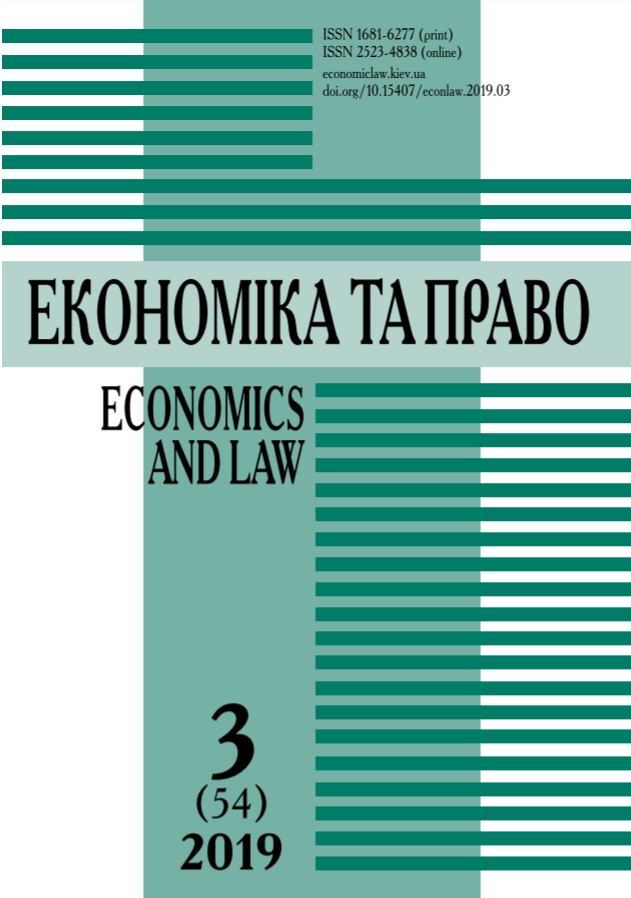PLACE OF STAFF IN THE FORMATION OF AN EFFECTIVE SYSTEM OF ANTI-CRISIS MANAGEMENT
DOI:
https://doi.org/10.15407/econlaw.2019.03.089Keywords:
personnel, management, crisis management, strategy, efficiency, competitiveness, analysis, executors, statistical dataAbstract
Organization management is always a hot issue; The organization of this process is especially important in the conditions of constant changes, overcoming the crisis. The second direction in the management system, which always remains relevant, is personnel management. In the article, these issues are combined into one - it is a study of the place of personnel in the crisis management system. The urgency of the issue is in the specificity of the staff and as a resource of the organization, and as a subject of all management processes in it, on the one hand, and accelerating the continuous development and finding of domestic enterprises in a permanent state of risk of a crisis, on the other. The article notes that the majority of researchers pay attention either to the disclosure of the specifics of crisis management, or to personnel management, or to anti-crisis management of personnel. The place of the personnel in the crisis management, the effectiveness of their participation in the content and results of management, the significance is almost not considered. Therefore, the article reveals the participation of staff in each component of crisis management, its actions and the ability to cause a crisis at each stage of the development and implementation of relevant management decisions. A list of elements of crisis management, which are consistent and important in optimizing practical activities, namely, strategy, management, financial and economic activities, labour organization, marketing, information systems, manufacturing, resources and corporate culture are proposed. Each element can and is divided in crisis management at certain stages of its formation and implementation. The place of the personnel in the formation of the organization’s strategy is disclosed in more detail. This process was divided into preparatory stages (the choice of methods for assessing the state of the organization, the study of the environment and the resource base), the analysis of the organization itself (including media), and the formation of a strategy (with a choice of its content in several steps, involving a significant number of personnel). For each stage, a list of the main actions of personnel of certain departments, groups was provided; The possible ways and causes of the crisis in this process and the impact on the entire content and the result of the strategy implementation are identified It was proved that more problems arise due to the lack of a sufficient level of staff competence, the lack of interest of the whole team in its development, as well as the lack of communication between different groups of workers and between workers and management. The prevention of these and other highlighted problems not only explains the importance of personnel in ensuring effective crisis management, but also gives the heads of organizations aviable mechanism for forming personnel support for a stable enterprise.
References
Pohrebniak A.Iu. Mekhanizm antykryzovoho upravlinnia na pidpryiemstvakh mashynobuduvannia: dys. ... kand. ekon. nauk: 08.00.04. Kyiv, 2016. 234 p. [in Ukrainian].
Staverska T.O., Zhyliakova O.V. Analiz sutnosti definitsii "antykryzova stratehiia" ta yii rol v protsesi antykryzovoho upravlinnia pidpryiemstvom. Ekonomichni nauky. 2016. No. 12/1(29). P. 14-17. [in Ukrainian].
Syrota V.S. Funktsionalni ta instytutsiini aspekty antykryzovoho menedzhmentu v bankivskykh ustanovakh Ukrainy: dys. ... kand. ekon. nauk: 08.00.08. Kyiv, 2015. 251 p. [in Ukrainian].
Antikrizisnoe upravlenie: Uchebnik. Pod red. Je.M. Korotkova. Moskow: INFRA-M, 2001. 432 p. [in Russian].
Antykryzove upravlinnia pidpryiemstvom: Navch. posib. Za zah. red. Z.Ie. Shershnovoi. Kyiv: KNEU, 2007. 680 p. [in Ukrainian].
Vasylenko V.O. Antykryzove upravlinnia pidpryiemstvom: Navch. posib. Kyiv: TsUL, 2003. 504 p. [in Ukrainian].
Karlova O.A. Vplyv kadrovoho menedzhmentu na systemu zhyttiezabezpechennia mista. Naukovo-tekhnichnyi zbirnyk "Komunalne hospodarstvo mist". Seriia "Tekhnichni nauky". 2007. No. 75. P. 39-42. [in Ukrainian].
Prodan I.O. Innovatsiinyi rozvytok v systemi upravlinnia personalom pidpryiemstv: dys. ... kand. ekon. nauk: 08.00.04. Ternopil, 2014. 190 p. [in Ukrainian].
Shester I.V. Formuvannia personalu innovatsiinoho pidpryiemstva: avtoref. dys. ... kand. ekon. nauk: 08.00.04. Sievierodonetsk, 2016. 21 p. [in Ukrainian].
Upravlinnia personalom: Navch. posib. Za zah. red. O.Ie. Kuzmina. Lviv: Vydavnytstvo Lvivskoi politekhniky, 2011. 240 p. [in Ukrainian].
Gavkalova N.L., Markova N.S. Menedzhment personala: Uchebnoe posobie. 3-e izd. Kharkiv: INZhJeK, 2009. 296 p. [in Ukrainian].


